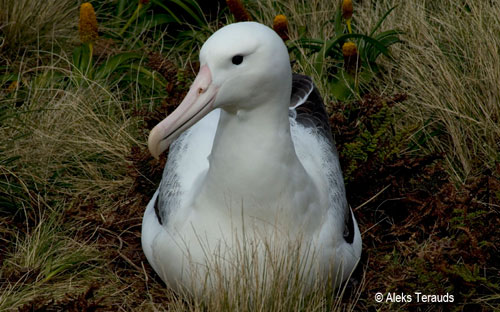An old record has come to light recently of a banded Southern Royal Albatross Diomedea sanfordi killed by a 70-m bottom trawler fishing for finfish in the South Atlantic. The bird died after colliding with the warp cable and was hauled on board on a splice in September 2008 between 47° and 51°S.
The albatross was banded (as R 21101) on Fizeau Ridge, Campbell Island, New Zealand on 1 Oct 1970 as a chick, making it 38 years old when it met its end.
The vessel was reported as using mitigation measures (bird-scaring lines) while fishing. The vessel's bosun had kept the band in his possession before passing it to a fisheries observer aboard late last year.
Southern Royal Albatrosses appear to be relatively rarely killed by collisions and entanglements with trawlers in the South Atlantic, although a few previous occurrences have been reported, including three on the Patagonian Shelf south of 46°S in a publication co-authored by Marco Favero, Chair of ACAP's Advisory Committee (click here) and one in a paper by Ben Sullivan of BirdLife International's Global Seabird Programme and his colleagues.

References:
Favero, M., Blanco, G., Garcia, G., Copello, S., Seco Pon, J.P., Frere, E., Quintana, F., Yorio, P., Rabuffetti, F., Cañete, G. & Gandini, P. 2011. Seabird mortality associated with ice trawlers in the Patagonian shelf: effect of discards on the occurrence of interactions with fishing gear. Animal Conservation 14: 131-139.
Sullivan, B.J., Reid, T.A. & Bugoni, L. 2006. Seabird mortality on factory trawlers in the Falkland Islands and beyond. Biological Conservation 131: 495-504.
With thanks to Marco Favero, Graham Parker and Graeme Taylor for information.
John Cooper, ACAP Information Officer, 26 February 2012, updated 27 February 2012

 English
English  Français
Français  Español
Español